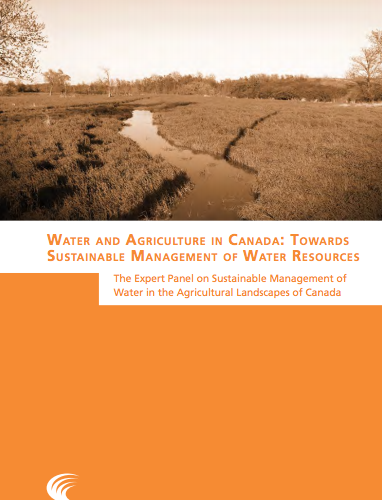Whiskey’s for drinking and water’s for fighting, or so the old saying goes. There’s no way of conveying the importance of water to agriculture more concisely. Water management is highly divisive and fraught with winners and losers. Given the contentiousness of managing this critical resource, the Hon. Gerry Ritz, federal Minister of Agriculture and Agri-Foods Canada (AAFC) has taken a smart approach.
Whiskey’s for drinking and water’s for fighting, or so the old saying goes. There’s no way of conveying the importance of water to agriculture more concisely. Water management is highly divisive and fraught with winners and losers. Given the contentiousness of managing this critical resource, the Hon. Gerry Ritz, federal Minister of Agriculture and Agri-Foods Canada (AAFC) has taken a smart approach. Ritz asked the Council of Canadian Academies to outline the additional science that is needed to better guide the sustainable management of water to meet the needs of agriculture, then withdrew AAFC from the discussions until after the final report was delivered.
To accomplish the task, the Council assembled a 15-member expert panel on Sustainable Management of Water in the Agricultural Landscapes of Canada. The panel saw its task as producing a fundamental review of how water is used in Canada’s widely varying ecosystems, as well as providing a balance between disciplinary, regional and economic considerations.
Over the 18 or so months of its existence, the panel went about this task with great energy and diligence – perhaps even a little too much energy. The resulting 200-page document can be described as good (indeed, very good) but it is not very likely to be effective. That is, the report explores water, agriculture and sustainability as well as could be expected, given the current absence of key data and information. And it does indicate what additional science would help reduce existing uncertainty.
Yet if the real goal is to influence scientific direction, it is unlikely to be effective in achieving it. The panel’s role was to indicate what science says, not what the government should actually do. By staying too cautiously on the safe side of that line, the panel missed an opportunity to draw conclusions that would be highly relevant to Canadian politics right now, especially given the Harper government’s abhorrence of scientific evidence.
In each of its five key chapters (organized to respond to five sub-questions that the panel received in addition to the overall charge), the panellists suggest various research proposals that would guide AAFC toward more sustainable management of water. However, apart from one generalized priority area per chapter, the report backs away from suggesting how to prioritize among the research topics. It does not indicate what scientific research is absolutely essential to move toward creating healthier, more sustainable landscapes.
In the absence of specific priorities, AAFC bureaucrats and the ministerial staff can pick and choose from the panel’s report, and we have no reason to expect that their collective choices will get Canadian agricultural landscapes any closer to sustainability. To the contrary, if recent experience is any guide, those choices will be aimed at ensuring only greater economic profitability in Canadian agriculture (as opposed to ecological prosperity as well). Only where the vectors of sectoral profitability and landscape sustainability overlap will this report’s suggestions be heeded in any meaningful way.
Water and Agriculture in Canada: Towards Sustainable Management of Water Resources, Ottawa: Council of Canadian Academies, 2013, 259 pages
Reviewer Information
David B. Brooks is a natural-resource economist and a member of Alternatives’ editorial board. He was a founding director of Canada’s Office of Energy Conservation, director of the Ottawa Office of Energy Probe, and, for the last 14 years of his formal professional career, associate director for environment and natural resource studies at Canada’s International Development Research Centre. When he is not in a canoe, he identifies ways to conserve fresh water.













